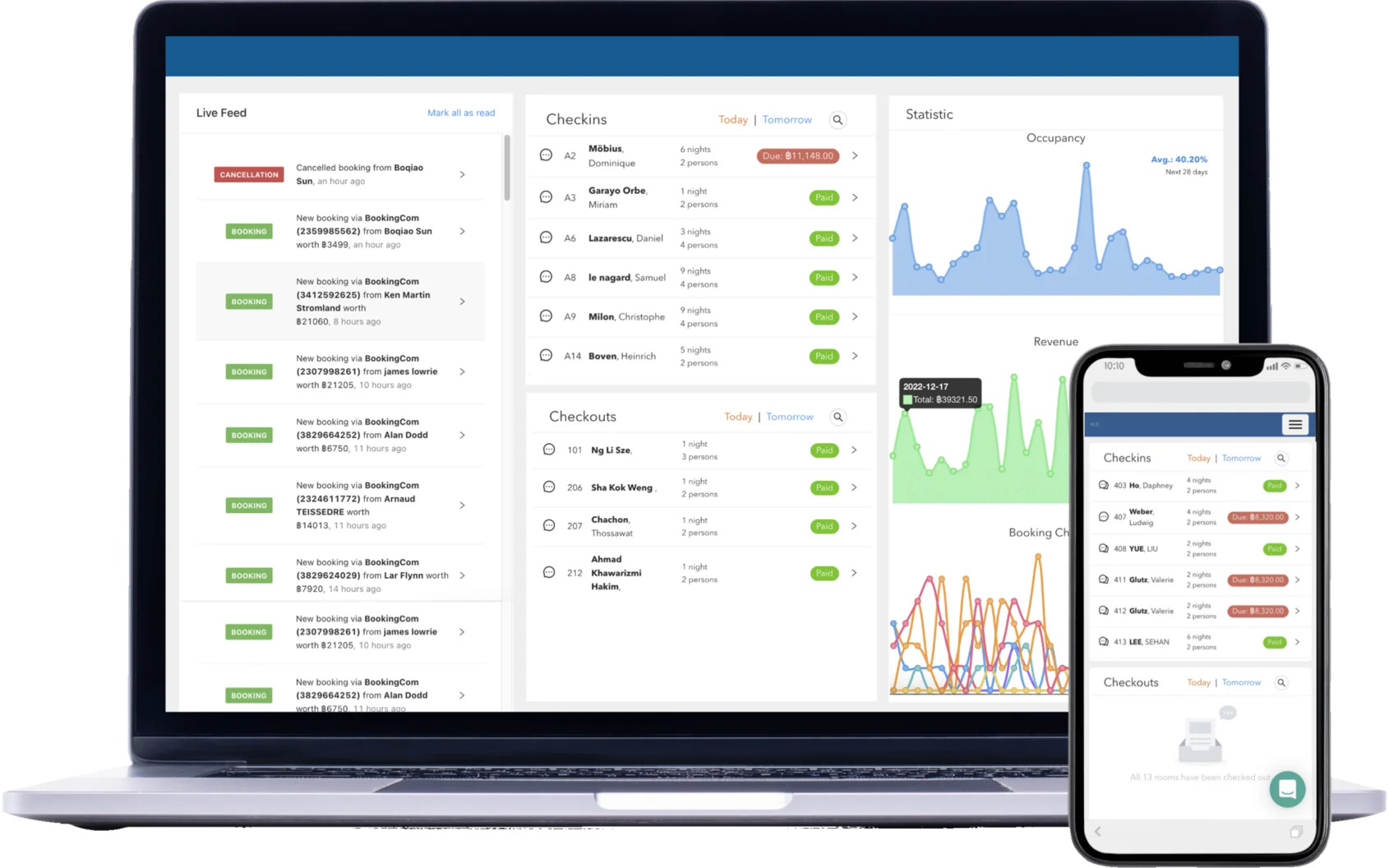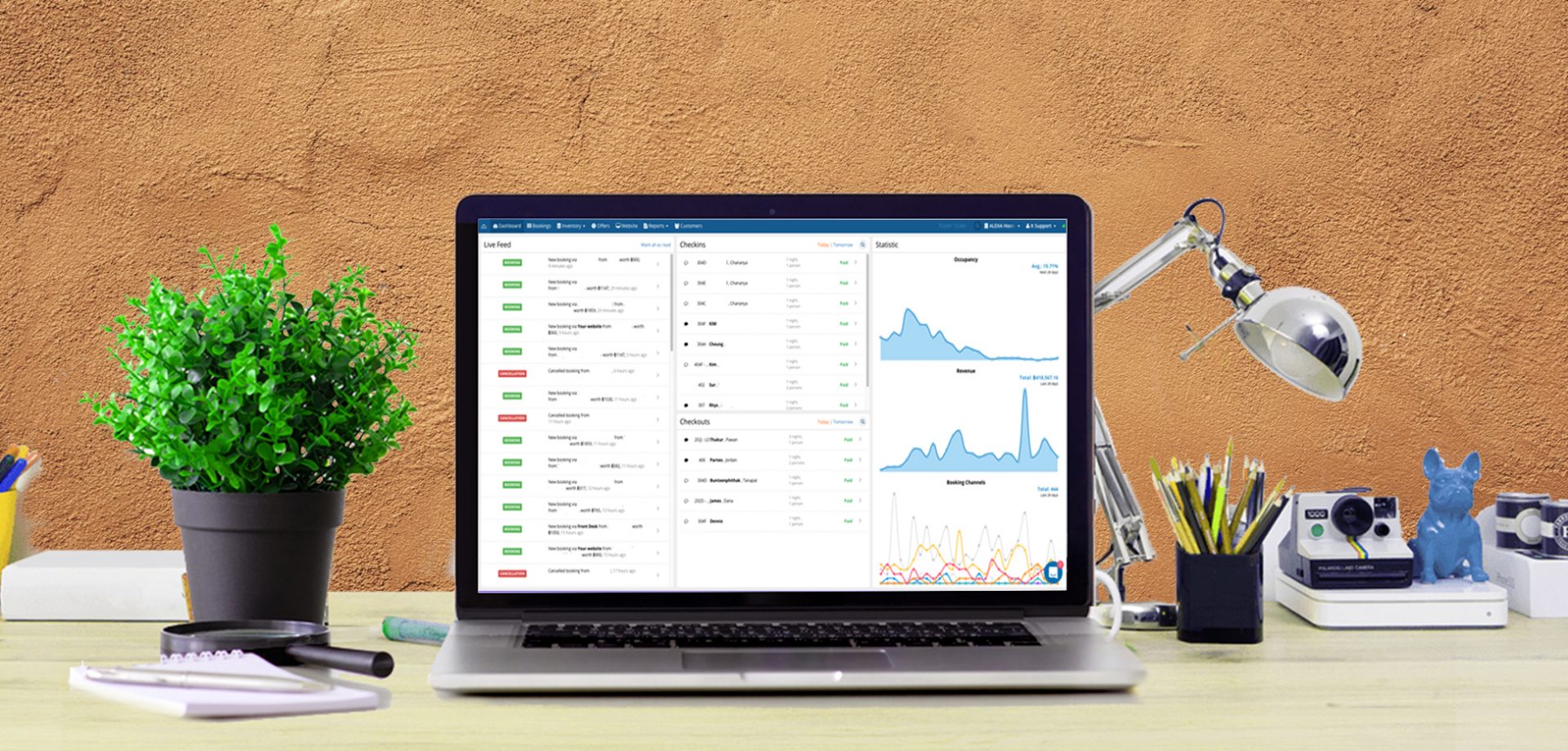What is a Hotel PMS?
A Hotel Property Management System (PMS) such as Hotecx is a tool crafted to simplify and unify key aspects of hotel operations, such as booking management, housekeeping coordination, payment handling, and guest services. Whether you run a small boutique hotel or oversee a large chain, a PMS serves as a crucial resource to streamline daily workflows, boost productivity, and elevate the guest experience.
In this overview, we delve into the essentials of a property management system, its functionality, the key features it offers, and the value it can add to your business. Additionally, we’ll provide practical advice for selecting the ideal system for your hotel and examine emerging trends that are shaping the evolution of PMS solutions.
A hotel property management system (PMS) is software that simplifies and connects the key operations of a hotel. It helps manage tasks like bookings, front desk operations, housekeeping, and reporting all in one place.
Key Features of a Hotel PMS:
- Reservations Management: Manage room bookings from multiple channels, including online travel agencies (OTAs), with real-time updates on availability.
- Front Desk Operations: Handle guest check-ins, check-outs, and maintain detailed guest profiles.
- Reporting and Analytics: Create reports to track performance and make decisions, such as adjusting room rates or availability.
- Housekeeping Coordination: Track room cleaning statuses, assign tasks, and make decisions about room readiness.
What is a Hotel PMS?
A hotel property management system (PMS) is software designed to simplify and centralize daily hotel operations. From managing reservations to coordinating housekeeping, a PMS provides the tools hoteliers need to run their properties efficiently while delivering great guest experiences.

How a Hotel PMS Works
A PMS serves as the central hub for all hotel operations. It connects departments like the front desk, housekeeping, and revenue management, ensuring smooth communication and automating routine tasks. Modern systems often operate on the cloud, making them accessible from anywhere and eliminating the need for manual updates.

Key Features of a Hotel PMS
- Reservations Management
- Sync bookings from direct channels and online travel agencies (OTAs).
- Update room availability in real time.
- Simplify group bookings and special requests.
- Housekeeping Coordination
- Track room statuses (e.g., clean, dirty, out-of-service).
- Assign and schedule tasks for housekeeping staff.
- Improve room turnover efficiency.
- Front Desk Operations
- Automate check-ins, check-outs, and payment processing.
- Manage guest profiles for personalized service.
- Streamline communication between staff and guests.
- Reports and Insights
- Generate detailed reports on revenue, occupancy, and trends.
- Use data to make informed decisions about pricing and promotions.
- Revenue Management
- Implement dynamic pricing strategies based on demand.
- Optimize revenue with tools for forecasting and rate adjustments.
- Mobile Access
- Enable staff to manage tasks on the go using mobile devices.
- Allow guests to check in, order services, or make requests via apps.
Benefits of Using a Hotel PMS
- Time Savings: Automate repetitive tasks like billing and email confirmations.
- Operational Efficiency: Centralize data to reduce errors and improve coordination.
- Revenue Growth: Use advanced tools to optimize pricing and track key metrics like ADR and RevPAR.
- Enhanced Guest Experience: Faster check-ins, personalized services, and mobile options improve satisfaction.
- Improved Security: Protect sensitive data with encryption and features like two-factor authentication.
Types of Hotels That Benefit from a PMS
A PMS is versatile and benefits various property types:
- Boutique Hotels: Manage personalized experiences and streamline operations.
- Resorts: Coordinate services across multiple departments.
- B&Bs: Simplify bookings and guest communications for smaller properties.
- Vacation Rentals: Sync availability across platforms and automate guest interactions.
- Hostels: Track high guest turnover efficiently.
- Serviced Apartments: Manage long-term stays with ease.
Trends Shaping Hotel PMS Technology
- Cloud Adoption: Cloud-based PMS solutions offer flexibility and real-time updates.
- AI and Automation: Tools like chatbots and predictive analytics enhance efficiency.
- Mobile Solutions: Staff and guests benefit from mobile-friendly features.
- Self-Service Options: Kiosks and apps let guests manage bookings and services independently.
- Enhanced Security: Stronger data protection measures address privacy concerns.

Choosing the Right Hotel PMS
When selecting a PMS, consider:
- Cloud vs. On-Premises: Choose based on your need for flexibility or control.
- Ease of Use: Ensure the system is intuitive for staff.
- Integration: Look for compatibility with your existing tools.
- Customization: Opt for features that suit your property’s needs.
- Support: Reliable customer service is essential.
Conclusion
A hotel PMS is the backbone of modern hotel operations, automating processes, improving efficiency, and enhancing guest experiences. By investing in the right system, hoteliers can save time, boost revenue, and focus on delivering exceptional hospitality.
Choose a hotel PMS that meets your current needs while allowing for future growth, ensuring long-term success for your property.